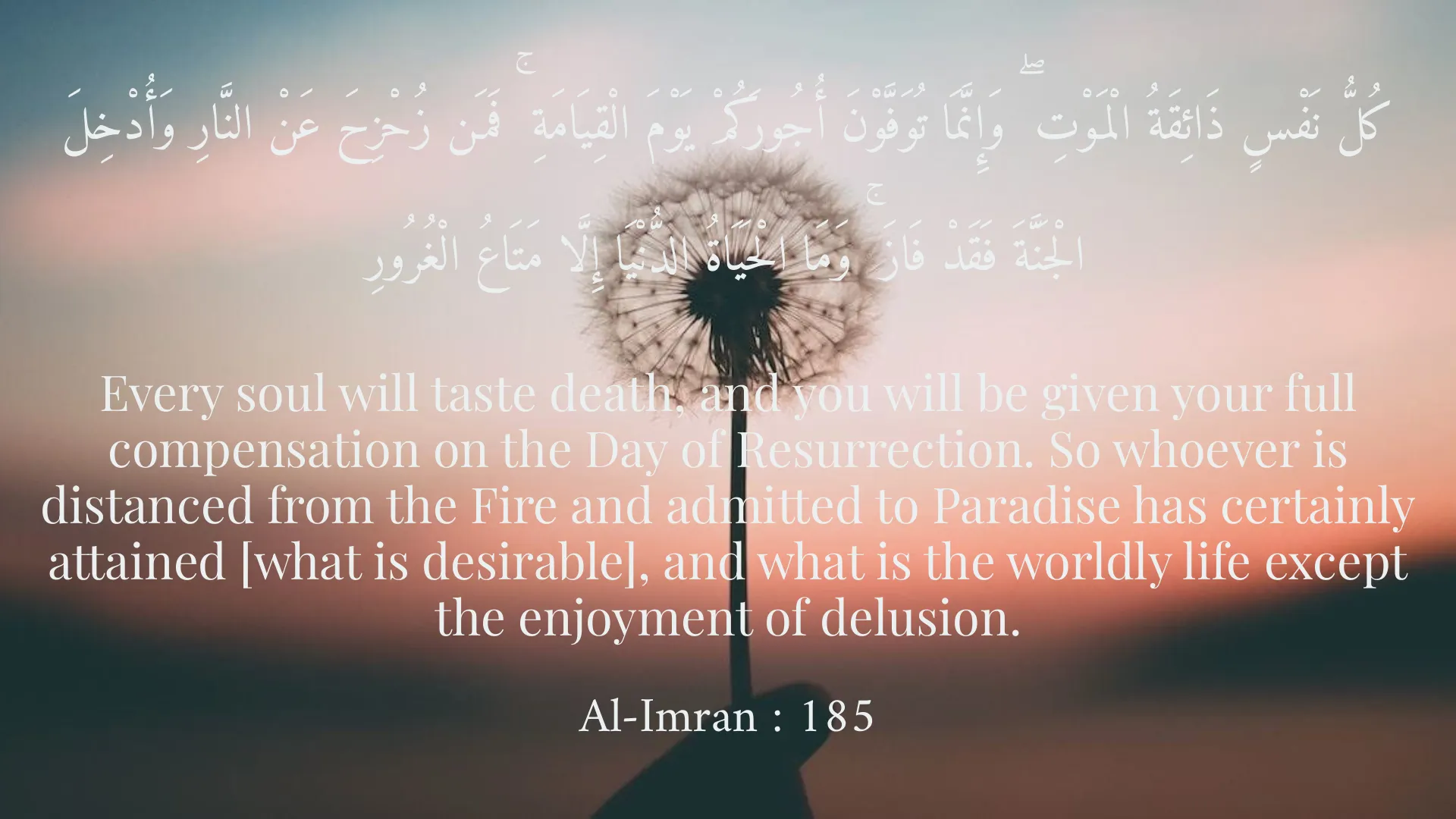Quranic Answer

Remembering death is a fundamental aspect of strengthening faith, and it is a topic that is deeply discussed within the Holy Quran. This essential reminder serves as a wake-up call for individuals to reflect on their existence and the ultimate realities of life and death. In various verses, the Quran poignantly emphasizes the transient nature of this world, urging believers to remain mindful of their faith and actions as they navigate the complexities of life. The concept of mortality is illustrated vividly in Surah Al-Imran, verse 185, where Allah states, "Every soul will taste death." This verse succinctly encapsulates the inevitability of death, establishing it as a universal truth that transcends beliefs, nationalities, and social status. By recognizing the certainty of death, individuals are led to contemplate the ephemeral nature of worldly possessions and blessings. Such reflections compel them to prioritize their spiritual lives over material pursuits, thereby fostering a deeper connection with their faith. The stark reminder of mortality also encourages believers to appreciate the fleeting moments of earthly life. Every day, people experience various challenges that might distract them from the ultimate goal of life—the preparation for the Hereafter. In thinking about death, individuals come to understand that life is a precious gift that should not be taken for granted. Each breath they take is an opportunity to make choices that align with their faith and values. Moreover, Surah An-Nahl, verse 61, serves as another critical reminder where Allah states, "And if Allah were to impose blame upon the people for what they earned, He would not leave upon the earth any creature, but He delays them for an appointed term. When their time has come, they will not remain behind an hour, nor will they precede it." This verse underscores the significance of being conscious of one’s faith and actions during their lifetime. It indicates that neglecting to observe one’s responsibilities toward Allah and fellow human beings can lead to straying from the path of righteousness. When one actively engages in the remembrance of death, it has profound implications on their daily life. This awareness can lead to a reevaluation of priorities, steering individuals toward gratitude and mindfulness. The small, seemingly insignificant moments begin to hold greater value as they remind the believer of both the beauty and unpredictability of life. Such mindfulness facilitates a deeper appreciation of relationships and experiences, transforming mundane tasks into opportunities for spiritual growth and reflection. The teachings of the Messenger of Allah (peace be upon him) reinforce the importance of this practice. In a hadith, he advised, "Frequently remember death, for the remembrance of death strengthens the heart and protects a person from many sins." This has significant implications for personal development and moral fortitude. By frequently contemplating death, believers can cultivate resilience against temptations and distractions that may lead them astray. The heart, often portrayed as the center of one’s intentions and feelings, becomes fortified against negative influences, allowing for a more purposeful approach to faith. The process of 'Tazkiyah' which is the purification of the soul, also becomes significantly enhanced through the remembrance of death. This means that believers are not only reminded of their eventual return to Allah, but they are also inspired to cleanse their hearts from malice, envy, and greed. Remembering death instills humility within individuals, a trait that is essential for spiritual growth. By realizing that every person's journey is finite, individuals develop compassion for others and become increasingly aware of the need to uplift and support their communities. Additionally, the remembrance of death can serve as a source of comfort and motivation. In the face of life's trials, individuals often turn to their faith as a means of solace. The belief that death is not the end but a transition to another state of existence can provide a sense of peace. It aims to alleviate fears surrounding mortality and encourages individuals to face life's challenges with courage and optimism. The teachings found in the Quran and Hadith are reminders that death is merely a passage rather than a conclusion. In conclusion, the remembrance of death is an integral practice that enriches one’s faith and spirituality. It calls upon believers to remain aware of the transient nature of life while emphasizing the importance of actions and intentions. Through this process, individuals learn to value even the smallest moments and harness them for greater meanings aligned with their faith. The reminders found in the Quran such as in Surah Al-Imran and Surah An-Nahl, coupled with the teachings of the Messenger of Allah, serve as vital tools for strengthening one’s moral character and faith. Ultimately, embracing the reality of death propels individuals towards leading more meaningful lives, creating a legacy built upon remembering Allah and seeking His pleasure, thus paving a path towards eternal success in the Hereafter.
Related Verses
كُلُّ نَفْسٍ ذَائِقَةُ الْمَوْتِ ۖ وَإِنَّمَا تُوَفَّوْنَ أُجُورَكُمْ يَوْمَ الْقِيَامَةِ ۚ فَمَن زُحْزِحَ عَنْ النَّارِ وَأُدْخِلَ الْجَنَّةَ فَقَدْ فَازَ ۚ وَمَا الْحَيَاةُ الدُّنْيَا إِلَّا مَتَاعُ الْغُرُورِ
Every soul will taste death, and you will be given your full compensation on the Day of Resurrection. So whoever is distanced from the Fire and admitted to Paradise has certainly attained [what is desirable], and what is the worldly life except the enjoyment of delusion.
Al-Imran : 185
وَلَوْلَا أَن كَانَ نَاسٌ مِّنْهُمْ مُؤْمِنِينَ وَيَخْشَوْنَ اللَّهَ لَمَسَّتْهُمْ فِي مَكَانِهُم مُّوَذَّبَةٌ.
And if it had not been for a decree from Allah that had preceded, it would have touched them in their place.
An-Nahl : 61
Short Story
One day, a man named Hasan was sitting by a large tree, contemplating his life. He was afraid of remembering death, but suddenly recalled the saying of one of the Islamic scholars that says, "Thinking about death brings one closer to Allah." Hasan decided that instead of fearing death, he would strengthen his faith through remembrance and make every effort to make the best choices in every moment of his life.